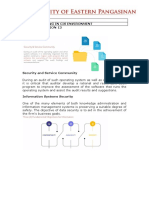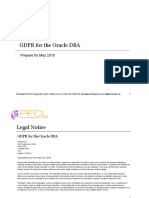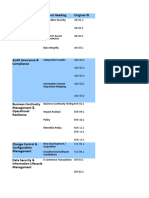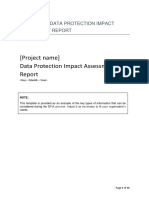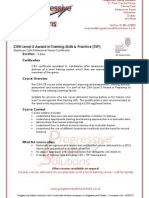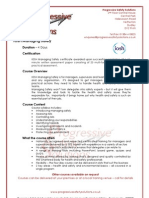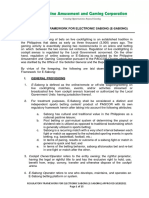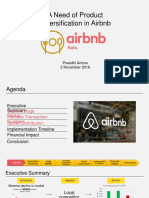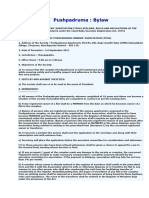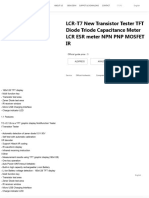Please note this is a template for guidance purposes only.
Insert your logo here for displaying on your website.
Data Protection Policy – Template
Policy information
The name of the organisation responsible as the Data
Controller
“data controller” means a person who (either alone or
Organisation jointly or in common with other persons) determines
the purposes for which and the manner in which any
personal data are, or are to be processed
Does the policy apply to branches, overseas offices etc. which
the Data Controller is responsible for or only part of the
organisation named above?
Do you have any Data Processors acting on your behalf? If
so, you should name them here.
Scope of policy
“data processor”, in relation to personal data, means
any person (other than an employee of the data
controller) who processes the data on behalf of the
data controller.
See below. A policy should be reviewed every 3 years
Policy operational date
This should be the organisation’s Data Protection Officer. If
Policy prepared by you process sensitive data, it is mandatory to appoint a DPO
Date approved by Board/
It is important that the policy should be approved by a Board
Management
if you have one
Committee
It is probably sufficient to review a Data Protection policy
Policy review date every three years.
02/07/2018 391217097.doc
� 2
Introduction
This should include the reason for the policy:
complying with the law
following good practice
Purpose of policy
protecting clients, staff and other individuals
protecting the organisation
This is where it is important to highlight the data you control.
Is it personal and/or sensitive? See the ICO website
definitions for details. Remember good practice applies to all
data, even if it is outside of GDPR regulations
Types of data
https://ico.org.uk/for-organisations/guide-to-the-general-
data-protection-regulation-gdpr/lawful-basis-for-
processing/special-category-data/
This should include a commitment to:
comply with both the law and good practice
respect individuals’ rights
be open and honest with individuals whose data is held
provide training and support for staff who handle
personal data, so that they can act confidently and
consistently
Notify the Information Commissioner voluntarily, even
if this is not required
Policy statement Please note the guidance from ICO on when breaches should
be reported as this is one of the main changes from the
current Data Protection Act and GDPR (https://ico.org.uk/for-
organisations/guide-to-the-general-data-protection-
regulation-gdpr/personal-data-breaches/)
Please also note the information on individuals’ rights which is
another key change (https://ico.org.uk/for-
organisations/guide-to-the-general-data-protection-
regulation-gdpr/individual-rights/)
This should identify the main risks within your organisation in
two key areas:
information about data getting into the wrong hands,
through poor security or inappropriate disclosure of
Key risks
information
individuals being harmed through data being inaccurate
or insufficient
02/07/2018 391217097.doc
� 3
Responsibilities
The Board / Company They have overall responsibility for ensuring that the
Directors organisation complies with its legal obligations.
There is no “right” person for this to be. It should be a fairly
senior person, at least. Their responsibilities include:
Briefing the Board on Data Protection responsibilities
Reviewing Data Protection and related policies
Advising other staff on tricky Data Protection issues
Ensuring that Data Protection induction and training
Data Protection Officer takes place
Notification to the ICO
Handling subject access requests
Approving unusual or controversial disclosures of
personal data
Approving contracts with Data Processors
Depending on the size of your organisation, you may want to
mention IT or Marketing for monitoring their own compliance
Specific Department Heads
with GDPR and reporting back to the DPO
All staff and volunteers should be required to read,
understand and accept any policies and procedures that
relate to the personal data they may handle in the course of
Employees & Volunteers
their work. (From now on, where ‘employees’ is used, this
includes both paid employees and volunteers.)
You may want to say what the penalties are for infringing the
Data Protection and related policies. You should state what
Enforcement training you provide and what methods of reporting you have
internally.
02/07/2018 391217097.doc
� 4
Security
Data Security is not wholly a Data Protection issue. Business
Continuity is included below but you may want to move this
Scope
to a separate policy
The greater the consequences of a breach of confidentiality,
Setting security levels the tighter the security should be
For each confidentiality level it may be worth setting out the
security measures to be followed, such as password
protection, clear desk policy, entry control
Security measures
This section should include your technical and organisational
security measures
This would include backup procedures (both for data and for
key employee availability) and emergency planning. As noted
Business continuity
above, it may be worth a separate policy
It may be worth setting out special precautions to be taken
when information is in particularly risky situations, such as
being worked on at home, with clients, at meetings, etc.
It may also be worth addressing “vishing” and “phishing”
where employees are tricked into giving away information
Specific risks
over the phone or by email. Tactics for dealing with the risks
of both are worth including
Common situations which may be worth mentioning include
whether contact details may be given over the phone
02/07/2018 391217097.doc
� 5
Data recording and storage
It may worth setting out measures to ensure data accuracy.
For example, where information is taken over the telephone,
how is it checked back with the individual? If information is
Accuracy
supplied by a third party, what steps will be taken to ensure
or check its accuracy?
If there is a regular cycle of checking, updating or discarding
old data, this should be mentioned. Please note the separate
requirements for the data you hold. For example, you cannot
Updating
keep CVs for more than 6 months unless you have express
permission from the candidates
If there are particular considerations about where specific
Storage information should be stored, this should be mentioned
It may be worth setting out retention periods for different
Retention periods types of data
The procedure for archiving or destroying data should be
Archiving mentioned, along with any special considerations (see above)
02/07/2018 391217097.doc
� 6
Right of Access
It may be worth reiterating who is responsible for ensuring
that right of access requests are handled within the legal time
Responsibility
limit which is one month
Right of access requests must be in writing. It may be worth
providing a standard request form. There should be a clear
responsibility on all employees to pass on anything which
might be a subject access request to the appropriate person
without delay.
Procedure for making It is probably not useful to go into detail on the right of
request access procedure in the policy. Requests are infrequent and
can be complex. They may require taking legal advice
https://ico.org.uk/for-organisations/guide-to-the-general-
data-protection-regulation-gdpr/individual-rights/right-of-
access/
Where the person managing the access procedure does not
Provision for verifying know the individual personally there should be provision for
identity checking their identity before handing over any information
You should provide the information free of charge. However
you can charge a ‘reasonable fee’ when a request is
manifestly unfounded or excessive, particularly if it is
repetitive.
You may also charge a reasonable fee to comply with
requests for further copies of the same information. This does
Charging
not mean that you can charge for all subsequent access
requests.
The fee must be based on the administrative cost of providing
the information
If the request is made electronically, you should provide the
information in a commonly used electronic format.
The GDPR includes a best practice recommendation that,
where possible, organisations should be able to provide
Procedure for granting remote access to a secure self-service system which would
access provide the individual with direct access to his or her
information. This will not be appropriate for all organisations,
but there are some sectors where this may work well
02/07/2018 391217097.doc
� 7
Transparency
The organisation should explain its commitment to ensuring
that Data Subjects are aware that their data is being
processed and
Commitment for what purpose it is being processed
what types of disclosure are likely, and
how to exercise their rights in relation to the data
If there are standard ways for each type of Data Subject to
be informed, these could be given, for example:
the handbook for employees
in the welcome letter or pack for members, with
Procedure
occasional reminders in the newsletter
during the initial interview with clients
on the web site
If different teams or employees are responsible for
transparency in relation to different types of Data Subject it
Responsibility
might be worth indicating this
Lawful Basis
GDPR states you must record the lawful basis for the personal
data you hold and you should set your basis for each Data
Subject type here (https://ico.org.uk/for-organisations/guide-
Underlying principles to-the-general-data-protection-regulation-gdpr/lawful-basis-
for-processing/)
Even where the organisation is not relying on consent, it may
wish to give people the opportunity to opt out of their data
Opting out
being used in particular ways
The organisation may wish to acknowledge that, once given,
consent can be withdrawn, but not retrospectively. There
may be occasions where the organisation has no choice but to
Withdrawing consent
retain data for a certain length of time, even though consent
for using it has been withdrawn
02/07/2018 391217097.doc
� 8
Employee training & Acceptance of responsibilities
All employees who have access to any kind of personal data
should have their responsibilities outlined during their
Induction
induction procedures
If there are opportunities to raise Data Protection issues
during employee training, team meetings, supervisions, etc.
Continuing training
this may be worth mentioning
Procedure for staff Give thought to how employees will show acceptance of their
signifying acceptance responsibilities to Data Protection. Will the policy be included
of policy in the Company Handbook etc.?
Policy review
It may be worth reiterating who has responsibility for
Responsibility carrying out the next policy review
It may be worth spelling out how other employees (and which
Procedure ones) will be consulted in the review
It may be worth setting out when the review has to be
Timing started, in order to be completed by the required date
For more information, please visit the ICO website: https://ico.org.uk/for-organisations/guide-
to-the-general-data-protection-regulation-gdpr/
When using a third party data processor, please read the guidelines here:
https://ico.org.uk/for-organisations/guide-to-the-general-data-protection-regulation-
gdpr/accountability-and-governance/contracts/
02/07/2018 391217097.doc






